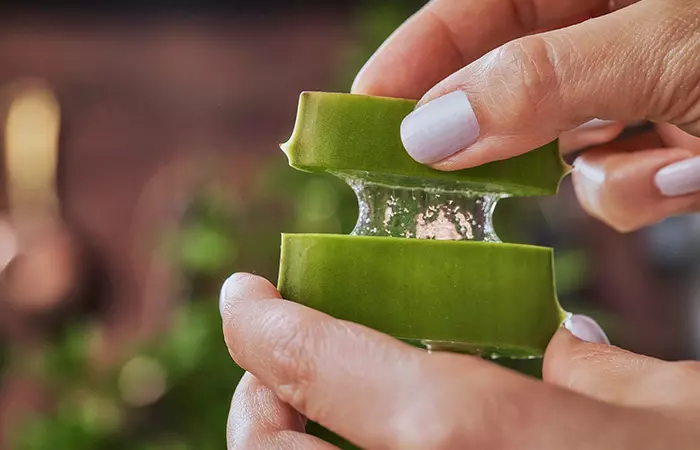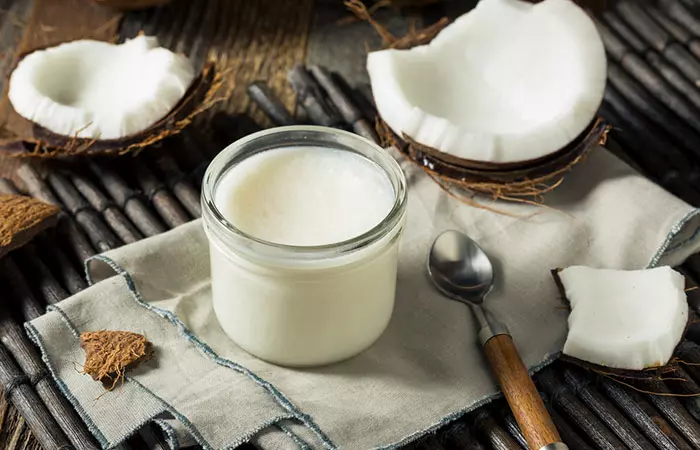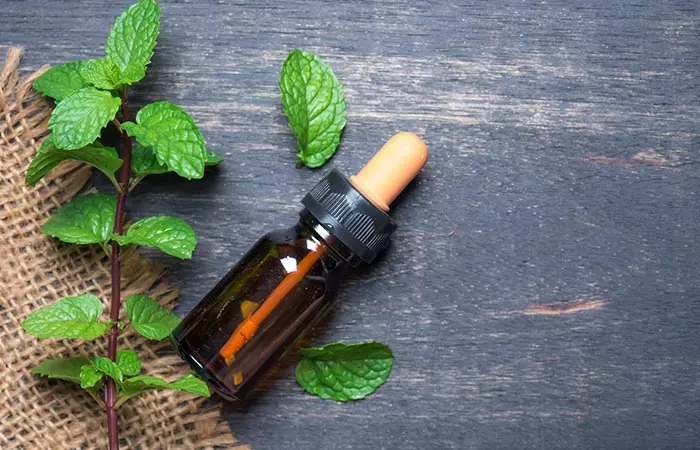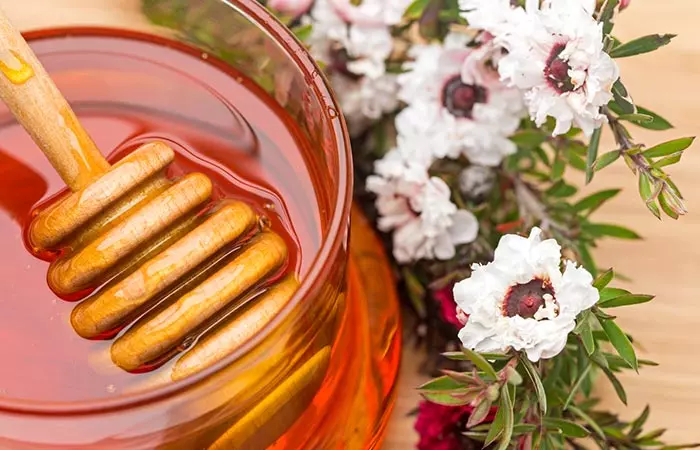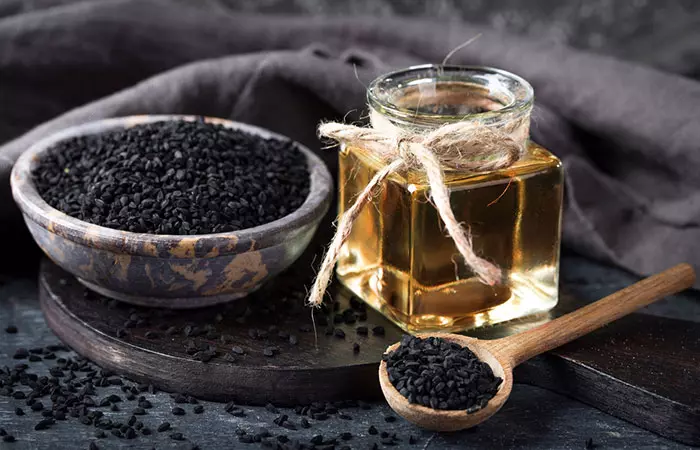Home Remedies To Treat Skin Allergies Naturally
1. Aloe Vera
Aloe vera gel is known for its healing properties (1). It not only speeds up the healing of the affected area but may also relieve dry, itchy skin and redness as it has hydrating and anti-inflammatory properties (2). You Will Need Aloe vera gel What You Have To Do How Often You Should Do This Do this 3 times every day for a couple of days.
2. Baking Soda
The alkaline nature of baking soda helps in restoring the lost pH of the affected skin and soothes itching and rashes (3), (4). This, in turn, speeds up the healing of your skin from an allergy. You Will Need
1 teaspoon of baking soda Water (as required)
What You Have To Do How Often You Should Do This Do this multiple times daily for quick relief.
3. Coconut Oil
Coconut oil contains medium-chain fatty acids that have moisturizing properties (5). It also exhibits analgesici Medications that relieve various types of pain. There are two types: Anti-inflammatory and opioid analgesics. and anti-inflammatory activities that help relieve redness and itching caused by skin allergies (6). You Will Need 100% virgin coconut oil What You Have To Do How Often You Should Do This Do this 3-4 times daily for a few days. Note: Coconut oil is not suitable for all skin types. Therefore, do a patch test before using it on the affected area.
4. Apple Cider Vinegar
Apple cider vinegar contains acetic acid, which exhibits anti-inflammatory and antimicrobial properties (7), (8). These can help in treating skin allergies and protect your skin from infection. However, some studies show that apple cider vinegar can cause skin irritation (9). You Will Need
1 tablespoon of apple cider vinegar 1 cup of water Cotton pads
What You Have To Do How Often You Should Do This Do this 2 times daily.
5. Essential Oils
a. Peppermint Oil
If you are looking for essential oils for itching and relieving other symptoms of skin allergies, peppermint oil is your solution. It contains menthol, which exhibits anti-inflammatory and numbing effects that offer immediate relief from swelling, redness, and itching (10), (11). You Will Need
6-7 drops of peppermint oil 1 teaspoon of any carrier oil (coconut, olive, or jojoba oil)
What You Have To Do How Often You Should Do This Do this 3-4 times every day for a couple of days.
b. Tea Tree Oil
Tea tree oil has excellent anti-inflammatory and antimicrobial properties (12). It can help provide immediate relief from inflammation and itchiness and also prevent further infection. You Will Need
6-7 drops of tea tree oil 1 teaspoon of any carrier oil
What You Have To Do How Often You Should Do This Do this 3-4 times daily.
6. Holy Basil (Tulsi)
Holy basil or tulsi exhibits potent antimicrobial activities that can protect your skin from microbial infections (13). It also has anti-inflammatory properties (14). This action of holy basil can help reduce the redness, swelling, and itchiness associated with a skin allergy. You Will Need
A handful of holy basil leaves Grinder
What You Have To Do How Often You Should Do This Do this multiple times daily for a few days.
7. Manuka Honey
Honey is a common home remedy for skin itching and irritation management. Manuka honey possesses powerful immunoregulatory and antimicrobial properties (15). It not only accelerates the healing of rashes resulting from an allergy but also provides relief from itching and redness. It is a natural humectant that helps reduce skin irritation (16). You Will Need 2-3 teaspoons of manuka honey What You Have To Do How Often You Should Do This Do this 3-4 times every day for a few days or until you notice a difference in your skin. Kim Steutermann Rogers, a writer and blogger, got a skin rash on her eyes after peeling a green mango. Although she didn’t immediately notice any side effects, her eyes got an itchy, burning sensation. She attributes it to the urushiol present in the sap of the mango tree. She tried to soothe the pain and itching with honey. She writes, “So, I tried the honey—a few dabs above each eye. And in the 24 steps it took for me to get from kitchen to bed, the itching, the burning, the urge to gouge out my eyes went away. Immediately. Completely. Miraculously. Easily (i).”
8. Guava Leaves
Guava leaves contain ethanolic extracts that exhibit strong anti-inflammatory properties (17). This can relieve the itchy and red rashes caused by skin allergies. You Will Need
A bunch of guava leaves Water
What You Have To Do How Often You Should Do This Do this 2 times daily.
9. Ginger
Ginger, a herbal product, exhibits anti-inflammatory and antimicrobial properties (18). Hence, it can work wonders in treating a skin allergy and soothing the inflammation and itchiness associated with it. You Will Need
A slice of ginger 1 cup of water Cotton balls
What You Have To Do How Often You Should Do This Do this 3-4 times daily.
10. Petroleum Jelly (Vaseline)
Petroleum jelly forms a protective layer on the affected area and can help prevent microbial infections. It also helps in keeping your skin moisturized, thereby speeding its recovery (19). You Will Need Petroleum jelly or Vaseline (as required) What You Have To Do How Often You Should Do This Do this for a day or two until your symptoms begin to disappear.
11. Lemon Juice
The anti-inflammatory nature of lemon juice helps relieve inflammation and redness, while its bactericidal properties prevent further infection to the affected area (20), (21). You Will Need
½ lemon 1 cup of warm water Cotton pads
What You Have To Do How Often You Should Do This Do this multiple times daily for a few days.
12. Black Seed (Kalonji) Oil
Kalonji or black seed oil possesses powerful anti-inflammatory, analgesic, and antipruritici An anti-itch medicine used to treat skin diseases that might cause excessive itching and thickened skin. properties that can be attributed to the presence of thymoquinone (22). These properties are extremely beneficial in the treatment of skin allergies. You Will Need Black seed oil (as required) What You Have To Do How Often You Should Do This Do this multiple times daily for a few days.
13. Neem
Neem can alleviate itching, redness, and swelling with its anti-inflammatory activities. It also contains nimbidin, a natural antihistaminei A class of medications that work by inhibiting the effects of histamines (a chemical found in the body) to relieve allergy symptoms. , which helps in treating the skin as well as other allergies (23). You Will Need
A few neem leaves (fresh or dried) Grinder
What You Have To Do How Often You Should Do This Do this 3-4 times daily for a couple of days or until you notice an improvement in your condition.
14. Vitamins And Minerals
Vitamins A, C, D and E are essential for healthy skin (24). They are powerful antioxidants that help in repairing damaged skin and also protect your skin from toxic reactions. Additionally, vitamin C boosts your immunity to skin allergies, and vitamin E manages inflammation and swelling with its anti-inflammatory properties. To get more of these vitamins through your diet, you must consume foods like carrot, cauliflower, cabbage, beans, chickpeas, broccoli, garlic, Brussels sprouts, sweet potatoes, citrus fruits, berries, spinach, kale, sprouts, nuts, lentils, and legumes for proper nutrition. If you wish to take additional supplements for these nutrients like zinc, resveratrol, selenium, copper, iron, riboflavin, or melatonin, do so only after consulting a doctor. Magnesium is a natural antihistamine (25). Taking it in supplement form can assist in alleviating allergy symptoms. Quercetin is another natural antihistamine you may take for allergic rhinitis. It is found in foods like onions, grapes, apples, shallots, and berries and is also available as a supplement (26). You can also take omega-3 fatty acids and bromelain supplements to help alleviate the symptoms (27),(28). Other vitamins and minerals like folate, vitamins B12 and B6, thiamine, niacin, pantothenic acid, biotin, choline, betaine, glutathione, and coenzyme Q10 are good for healing, protecting, hydrating, and nourishing your skin. You can also follow a gluten-free diet as it eliminates most allergens. Note: While the natural remedies mentioned above may be effective, it is important to use them with caution. Always consider individual sensitivities and potential interactions, as everyone’s body reacts differently. If you are using a topical remedy, always perform a patch test. For changes in diet, consult a healthcare professional for personalized suggestions. Other foods that you can include in your diet are fermented foods rich in probiotics, quinoa, and bone broth might help reduce allergic reactions (29). You can follow the tips mentioned below to help these remedies work even better.
Prevention Tips
Avoid contact with the allergen, irritant, or chemicals that trigger your allergy like detergents, pesticides, insecticides, herbicides, fungicides, etc. Water filtration and purification systems get rid of toxic substances in the water to protect your skin from reacting to these allergens. If you have come into contact with a potential allergen, use a gentle soap to wash it off your skin. Use a cold compress or take a cold shower to relieve mild itching. Avoid wearing tight clothes. Instead, wear loose cotton clothing. Avoid overexposure to sunlight to protect your skin from harmful UV rays and radiation. Environmental control systems and cleaning gadgets like air purifiers, humidifiers, dehumidifiers, and vacuum cleaners can help get rid of dust mites, smoke, pollen, mold, etc.
Along with keeping the above tips in mind, you also need to pay attention to your diet. Listed below are some of the most common food allergens that are best avoided by those with skin allergy.
Foods To Avoid
The eight major food allergens that are known to cause a skin allergy are:
Milk and most dairy products Eggs (poultry) Fish Shellfish Tree nuts Peanuts Wheat Soybeans, tofu, tempeh, Citrus fruits Seeds like pumpkin, sesame, sunflower
All allergy patients need not avoid the above foods. However, if you doubt your skin allergy is exacerbated by a certain food, it is better to avoid that. Given below are the factors that cause a skin allergy.
What Causes A Skin Allergy?
Some of the most common causes of skin allergies are:
Nickel, a metal widely used in jewelry, cosmetics, soaps, shampoos, and lotion. Other toxic substances like lead, mercury, formaldehyde, benzene, toluene, xylene, radon, and asbestos. The latex used in clothing, condoms, balloons, and gloves. Insect bites Pet dander Foods Bug sprays and certain sunscreens Medications like anti-itch creams and antibiotics Fragrances Cleaning products Plants like poison ivy and stinging nettle Lavender and peppermint essential oil
An online survey conducted on 2008 US adults found that 41.7% of American adults reported having allergies, out of which 41.4% reported skin allergies and 47.7% also reported experiencing skin reactions. Let us now take a quick look at the symptoms that surface because of skin allergies.
Signs and Symptoms Of Skin Allergies
Itchiness Redness Dry and scaly skin The appearance of small fluid-filled blisters
These symptoms are common to various allergic reactions. The following are the different types of skin allergies.
Types Of Skin Rashes
Atopic dermatitis: A childhood disorder that causes red itchy rashes on the elbows and the back of the knees. In case of severe atopic dermatitis, you may also experience red spots on the face.
Seborrheic dermatitis: This type of skin allergy results in red, scaly, and itchy lesions that mostly affect the scalp, forehead, brows, cheeks, and external ears.
Contact dermatitis: A skin allergy brought about by contact with certain chemicals that an individual may be allergic to. The wrist due to a watch, or the finger due to a ring might be affected.
Diaper rash: A type of irritant contact dermatitis that mostly affects infants and some adults who wear diapers soiled with feces and urine for too long. Fungal infection or yeast can also cause diaper rash.
Stasis dermatitis: An oozy skin allergy that occurs on the lower legs of individuals who have chronic swelling due to poor blood circulation and/or poor lymphatic drainage.
Nummular eczema: An oozy skin allergy that surfaces as coin-shaped plaques on extremely dry skin during the winter.
Drug eruptions: Certain antibiotics and pain relievers could produce allergic skin reactions as a side effect.
Understanding the cause and type of skin allergy may help you treat it successfully. But if home remedies fail to work, consult your doctor for other treatment options. Check out the next section to learn more.
Medical Treatments For Skin Allergies
Your doctor may prescribe any one or a combination of the following medications to reduce inflammation and itching and combat infection:
Antibiotic pills or ointments (30) Topical steroids like hydrocortisone cream (31) Antihistamines (32) Topical calcineurin inhibitors (33)
In case you are unaware of what you are allergic to, your doctor may also prescribe allergy tests to identify the trigger. They may then put you on the appropriate treatment. What happens to your body when you have a food allergy? When you have a food allergy, your immune system reacts by producing antibodies called immunoglobulin E (IgE). They travel to your cells and initiate a cascade of chemicals, causing an allergic reaction. This release causes symptoms in the nose, lungs, sinuses, throat, ears, and skin. There are also IgG delayed food allergy symptoms. How long does it take for an allergic reaction to go away? For most allergic reactions, the symptoms begin to fade away within a few hours after the allergen has been removed. They usually clear completely in about two days. Which medicine works best for skin allergies? Your doctor might prescribe antihistamines or topical creams containing hydrocortisone to treat skin allergies. However, antihistamines can cause drowsiness, and long-term use of hydrocortisone causes thinning skin. You can opt for alternative therapies like homeopathy, acupressure, or reflexology (34). You can also consider immunotherapy (allergen desensitization),ozone therapy, sauna, or hydrotherapy to help manage the symptoms (35),( 36), (37), (38). Which is the best cream for a skin allergy? You can use anti-itch creams containing hydrocortisone or safer applications like calamine lotion. If you are looking for natural alternatives, any of the above remedies will do the trick. Which soap works best for a skin allergy? Soaps containing oatmeal, like Aveeno, or olive oil are great for those with skin allergy. Cetaphil soap is another good option. How long can a skin allergy last? Skin allergies usually remedy on their own within a week or two, but treatment may make you feel better in the meantime. However, in case of severe symptoms, such as breathing difficulty or puffiness in your throat, dial 911 immediately. How do you treat skin allergies in babies? Anecdotal evidence suggests that a fragrance-free hydrating moisturizer or ointment may help if the child’s skin is dry. In addition, topical steroid creams are often recommended by doctors. When should I be concerned about a skin allergy? In case of a recurring condition, or if the skin doesn’t clear up within a few weeks. Immediate medical assistance may be required if a rash is followed by a fever, breathing difficulties, pain, blistering, peeling, or swelling, or if a rash develops and spreads too quickly all over the body, or creates rings. What does diabetic skin rash look like? Diabetic patients frequently develop skin rash that appears as red or brown lines, or spherical patches on the skin. Although it doesn’t hurt, it could be itchy.
